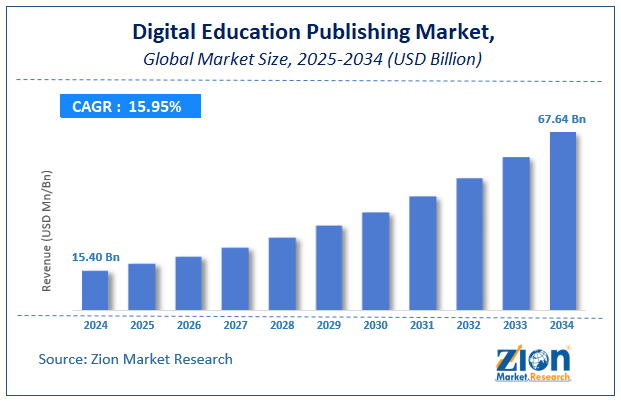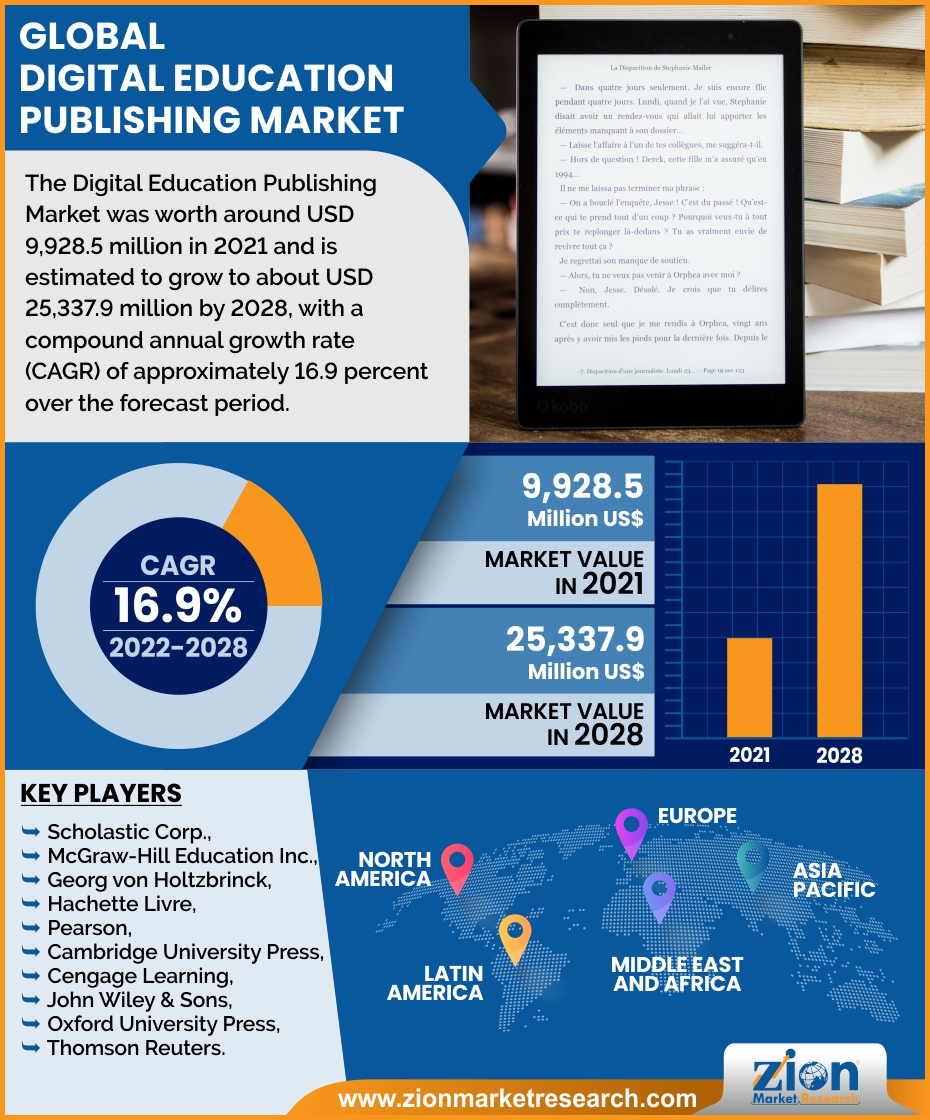Digital Education Publishing Market Trend, Share, Growth, Size and Forecast 2028

Digital Education Publishing Market By Product Type (Digital Textbooks, Digital Assessment books, and Others). By End User (K-12, Higher Education, and Corporate or Skill-Based). and By Region - Global Industry Perspective, Comprehensive Analysis, and Forecast, 2022-2028
| Market Size in 2021 | Market Forecast in 2028 | CAGR (in %) | Base Year |
|---|---|---|---|
| USD 9,928.5 million | USD 25,337.9 million | 16.9% | 2021 |
Digital Education Publishing Market Size
The Digital Education Publishing Market was worth around USD 9,928.5 million in 2021 and is estimated to grow to about USD 25,337.9 million by 2028, with a compound annual growth rate (CAGR) of approximately 16.9 percent over the forecast period. The report analyzes the Digital Education Publishing Market drivers, restraints/challenges, and the effect they have on the demands during the projection period. In addition, the report explores emerging opportunities in the Digital Education Publishing Market.
Digital Education Publishing Market: Overview
Digital education publishing refers to the use of digital media to commercialize educational information. The content is available on several pages and is compatible with a wide range of platforms, including computers, cellphones, desktop computers, and tablets. The rising global adoption of smartphone devices is one of the primary factors driving the growth of the digital educational publishing business. Additionally, the increasing efforts made by numerous institutes to provide distance learning facilities are expected to drive the growth of the digital educational publishing market during the forecast period. Apart from the widespread availability of high-speed Internet connection, the rapid construction of internet infrastructure in emerging markets such as India has accelerated the adoption of mobile devices in these countries. As a result, the market is expanding. Consumers' reading tastes are evolving away from traditional print media and toward device-compatible digital forms with the growth of Internet-enabled digital gadgets such as mobile phones and tablets.
Digital education publishing involves usage of digital platforms to publish educational content. Digital education publishing is an alternative for textbooks. Digital content for education is available in various formats and is compatible with smartphones, laptops, desktop PC, and tablets. Digital books are available on various sites and require certain licensing fees for students to get access. The process of publishing e-books is cost effective and efficient as compared to regular print textbooks.
Covid-19 Impact
The coronavirus pandemic has triggered a chain of unprecedented events that have affected every business. With the ongoing spread of the novel coronavirus pandemic, businesses around the world are gradually flattening their recessionary curves by leveraging technology. Many firms will go through periods of response, recuperation, and renewal. Building business resilience and allowing agility can help firms progress in their recovery from the COVID-19 problem. The extensive development of the COVID-19 pandemic will have a beneficial impact on the digital educational publishing business during the projection period. Due to the influence of COVID-19, educational institutions have been closed, resulting in the substitution of schools and universities with online learning. As a result, the digital learning and digital publication markets are expanding rapidly.
Digital Education Publishing Market: Driver
The rapid penetration of smartphones will be an important factor in the market's growth.
The rising global adoption of smartphone devices is one of the primary factors driving the growth of the digital educational publishing business. Consumer reading tastes are gradually shifting away from traditional print media and toward device-compatible formats such as smartphones. It enables many of the world's largest educational content publishers to deliver a diverse range of digital content that can be accessed via internet-enabled smartphone devices such as mobile phones and tablets. Many countries are taking various initiatives to increase the use of digital technology in education. Multiple institutes' initiatives to provide remote learning facilities are also predicted to fuel the growth of the digital education publishing market over the forecast period.
Digital Education Publishing Market: Restraint
The Market's Growth May Be Affected by Open-Source Platforms
With the introduction of massive open online courses, the availability of free-source platforms such as Mozilla Firefox, Google Chrome, Apache HTTP server, and others may pose a challenge to the expansion of the digital educational publishing sector. Furthermore, digital and mobile material must implement more strict security and content quality requirements. These concerns may stymie the growth of the digital educational publishing business.
Digital Education Publishing Market: Opportunities
Major Investment Opportunities are Being Created as a Result of Government Initiatives
Governments throughout the world are launching a variety of programs to increase the adoption of digital technology in the education sector. The strategy was largely concerned with the use of digital technology devices in educational institutions, as well as the development of digital literacy and abilities in students. Similarly, developing countries like China and India are encouraging the use of technology-enabled education through a variety of programs. Many such government-sponsored projects are helping the worldwide digital educational publishing market grow. Such government programs generate significant investment potential.
Digital Education Publishing Market: Segmentation
The Digital Education Publishing Market is segregated based on Product Type, and End User.
By Product Type, the market is classified into Digital Textbooks, Digital Assessment books, and Others. The digital textbooks sub-segment generated the largest revenue share and is predicted to grow exponentially at a CAGR of 16.5 percent during the forecast period. Digital textbooks are incredibly cost-effective, make it easier to track students' progress, and are far less expensive to update. Open-source e-textbooks may allow for the creation of free, editable textbooks for traditional courses, or they may allow individual teachers to generate their own content for their own classes. This endeavor may provide better access to quality texts in the current world. During the projected period, these factors are expected to drive the segment’s growth in the digital educational publishing market.
By End User, the market is classified into K-12, Higher Education, and Corporate or Skill-Based. The K-12 sub-segment earned the highest revenue and is predicted to expand substantially during the projection year. The growing interest in real-life skills, as well as social-emotional learning given by K-12 schools, is likely to drive the growth of the digital educational publishing market during the forecast period. Schools are changing away from the traditional chalkboard approach and toward integrating smart technology into learning settings, which is driving the K-12 education market. Along with emphasizing 21st-century competencies, K-12 schools began to emphasize the importance of life skills and social-emotional learning. These major developments in the K-12 sub-segment are projected to contribute to revenue growth.
Digital Education Publishing Market: Report Scope
| Report Attributes | Report Details |
|---|---|
| Report Name | Digital Education Publishing Market |
| Market Size in 2021 | USD USD 9,928.5 Million |
| Market Forecast in 2028 | USD USD 25,337.9 Million |
| Growth Rate | CAGR of 16.9% |
| Number of Pages | 157 |
| Key Companies Covered | Scholastic Corp., McGraw-Hill Education Inc., Georg von Holtzbrinck, Hachette Livre, Pearson, Cambridge University Press, Cengage Learning, John Wiley & Sons, Oxford University Press, Thomson Reuters., |
| Segments Covered | By Product Type, By End-User and By Region |
| Regions Covered | North America, Europe, Asia Pacific (APAC), Latin America, Middle East, and Africa (MEA) |
| Base Year | 2021 |
| Historical Year | 2016 to 2020 |
| Forecast Year | 2022 - 2028 |
| Customization Scope | Avail customized purchase options to meet your exact research needs. Request For Customization |
Digital Education Publishing Market: Regional Landscape
North America's market is predicted to lead the global digital educational publishing sector in terms of value, and this trend is expected to continue during the assessment period. The subsequent surge in online communications in this region is projected to promote market growth. Furthermore, increased smartphone penetration among consumers, combined with the prevalence of work-from-home culture in this region, is likely to fuel regional market growth throughout the projection period. Increased online communications, as well as an increase in work-from-home structures across North America, have led to a boost in the need for digital publishing, which is expected to drive the area market during the projection period.
Asia-Pacific is the fastest-growing region and is predicted to account for a sizable share during the forecast period. The growing popularity of smartphones in emerging economies such as China and India is driving the Asia-Pacific market. Furthermore, decreasing smartphone prices as a result of increased competition among manufacturers and service providers are projected to extend the user base, benefiting the digital educational publishing business.
Digital Education Publishing Market: Competitive Landscape
Some of the main competitors dominating the Digital Education Publishing Market include -
- Scholastic Corp.
- McGraw-Hill Education Inc.
- Georg von Holtzbrinck
- Hachette Livre
- Pearson
- Cambridge University Press
- Cengage Learning
- John Wiley & Sons
- Oxford University Press
- Thomson Reuters.
Digital Education Publishing Market is segmented as follows:
By Product Type
- Digital Textbooks
- Digital Assessment books
- Others
By End-User
- K-12
- Higher Education
- Corporate or Skill-Based
By Region
- North America
- The U.S.
- Canada
- Europe
- France
- The UK
- Spain
- Germany
- Italy
- Rest of Europe
- Asia Pacific
- China
- Japan
- India
- South Korea
- Southeast Asia
- Rest of Asia Pacific
- Latin America
- Brazil
- Mexico
- Rest of Latin America
- Middle East & Africa
- GCC
- South Africa
- Rest of Middle East & Africa
Table Of Content
Methodology
FrequentlyAsked Questions
The rising global adoption of smartphone devices is one of the primary factors driving the growth of the digital educational publishing business. Additionally, the increasing efforts made by numerous institutes to provide distance learning facilities are expected to drive the growth of the digital educational publishing market during the forecast period.
According to the Market Research report, the Digital Education Publishing Market was worth about 9,928.5 (USD million) in 2021 and is predicted to grow to around 25,337.9 (USD million) by 2028, with a compound annual growth rate (CAGR) of around 16.9 percent.
North America's market is predicted to lead the global digital educational publishing sector in terms of value, and this trend is expected to continue during the assessment period. The subsequent surge in online communications in this region is projected to promote market growth. Furthermore, increased smartphone penetration among consumers, combined with the prevalence of work-from-home culture in this region, is likely to fuel regional market growth throughout the projection period.
Some of the main competitors dominating the Digital Education Publishing Market include - Scholastic Corp., McGraw-Hill Education Inc., Georg von Holtzbrinck, Hachette Livre, Pearson, Cambridge University Press, Cengage Learning, John Wiley & Sons, Oxford University Press, and Thomson Reuters.
RelatedNews
HappyClients
Zion Market Research
Tel: +1 (302) 444-0166
USA/Canada Toll Free No.+1 (855) 465-4651
3rd Floor,
Mrunal Paradise, Opp Maharaja Hotel,
Pimple Gurav, Pune 411061,
Maharashtra, India
Phone No +91 7768 006 007, +91 7768 006 008
US OFFICE NO +1 (302) 444-0166
US/CAN TOLL FREE +1 (855) 465-4651
Email: sales@zionmarketresearch.com
We have secured system to process your transaction.
Our support available to help you 24 hours a day, five days a week.
Monday - Friday: 9AM - 6PM
Saturday - Sunday: Closed







